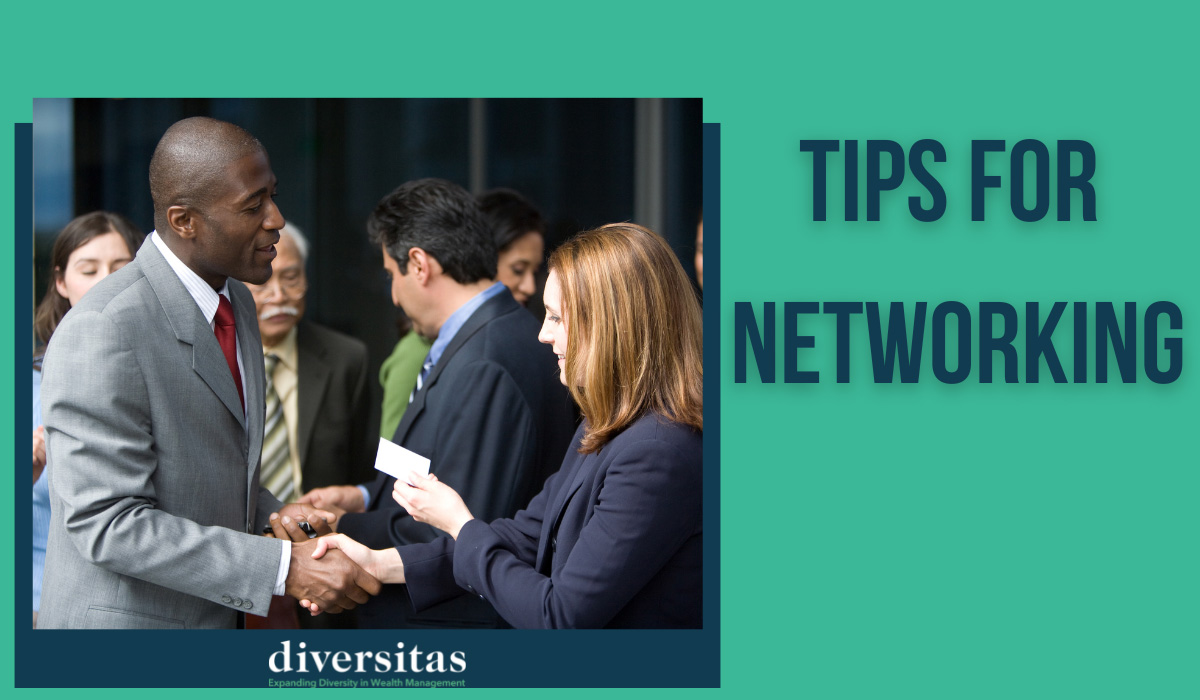For our November Forum, we hosted an expert panel that shared various viewpoints on networking. Before we share takeaways from the event, meet the panelists:
- Dominique Henderson, CFP, Trusted Advisor and Career Coach, moderator, and panelist
- Lisa Crafford, MBA Director and Head of Business Consulting at BNY Mellon Pershing
- Erica Hollingsworth, Operational Specialist at Charles Schwab
Shevawn Jester, a Senior Manager, Business Enablement at RBC Wealth Management, wasn’t able to participate in the panel as originally planned, but she was surely missed.
The panelists shared great advice for both students and professionals looking to improve their networking skills. If you couldn’t make it, we’ve recapped some of the top tips below.
Be Your Authentic Self
The panelists agreed that being yourself at networking events is the best advice.
“I tried to be someone else, and I ended up with a job I didn’t like,” Erica said. “Incorporate the things you like into the conversation, and you’ll learn a lot more about different opportunities from honest conversations.”
Erica noted that her current manager considers a job candidate’s personality when hiring decisions. Finding employees that fit comfortably within the company’s culture benefits both the individuals working and the company as a whole.
“What you know is important, but most people can be taught a job, so it’s important to see if you’ll fit in with the company,” she said. “Be yourself, and that will get you pretty far.”
Prepare Before Networking Events
When you enter a networking event, it’s easy to feel like you’re supposed to know everything or everyone there. Dominique suggested showing up with “informed curiosity.”
“Know who the CEO is, visit the company website, but be curious in how you’re framing your conversations during the event,” he said. “If you can get a list of who will be participating, you can see if they’ve been on a podcast and what they talked about, get data points you can bring into the conversation to make it a little less awkward. Leverage the fact that most people really like to talk about themselves, that opens the door for being memorable.”
Erica suggested treating networking preparation similarly to interview preparation. Look at the websites of the companies attending the event and understand their missions, so you’ll know who you’re talking to.
Ask the Right Questions
On top of preparing, it’s wise to have some questions ready to keep the conversation flowing.
“Instead of asking, ‘What does your company do,’ which can show a lack of preparation, ask the person about their role,” Lisa said. “You can learn about the company, their personas, their story, how long that person has worked there, and what they like most about their job. Going in and asking personal but not intrusive questions is a nice way to start the conversation.”
Lisa also suggested asking what roles the company is looking to fill. There are often overlooked opportunities at companies simply because they’re new roles, especially at larger companies.
Dominique’s tactic is to discuss recent industry news he’s read about or heard on a podcast. Having something you can fall back on to talk about is another way to keep the conversation moving.
Use Social Media to Jumpstart Connections
LinkedIn is the standard for professional networking platforms, and while it’s wise to use it, there are some important things to keep in mind.
“Don’t forget to have a great headshot and headline on your profile,” Dominique said. “It only takes me three seconds to decide if I will accept or decline a connection request.”
He also suggested using LinkedIn’s QR code to make connections in real time while attending networking events.
Lisa prefers to use LinkedIn to make initial connections — or to keep in touch with acquaintances — but uses email or phone calls to grow meaningful relationships.
“Going out and building your network in a meaningful and conscious way is good,” she said. “It’s okay if you don’t know a lot of people in the industry or have much experience, it’s your resume, but it’s also your brand. Use that page to tell your story, put what’s most important to you on there.”
She also suggested adding a personalized note to connection requests you don’t know. After making the request, don’t spam anyone. Be genuine on LinkedIn if you want to make proper connections.
Understand Your Why
The panel discussed what people could do if they’re looking to switch jobs or even industries regarding attending networking events. Their biggest tip was to be confident about why your career is changing.
“If you get real sure and confident about your why — what compelled you to make the switch, what type of change you want to affect in the industry — if you do a good job on that, that will lead you to your how,” Dominique said.
Lisa suggested leaning into your story and having the confidence to share it with whomever you’re networking without apologizing or justifying it.
“People are probably curious about why you made your decision, so get good at telling that story because it’s compelling,” she said. “Your story needs to be told.”
To watch the entire session, please click here. If you’re looking for an internship, check out the Careers tab on our website, and stay in touch with us to hear about upcoming events and opportunities![vc_widget_sidebar sidebar_id=”default” el_class=”post-sidebar”]






